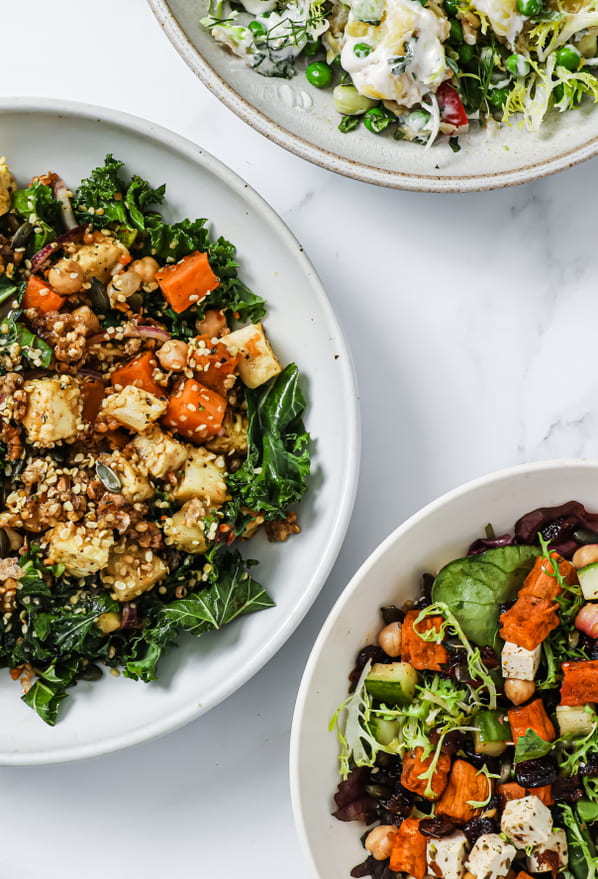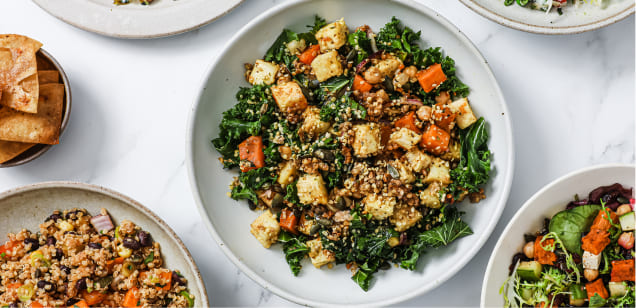Plant-based for the planet
Vegan diets are proven to have considerably lower carbon, water, and ecological footprints in comparison to meat and fish-based diets.
In order to understand why a vegan diet is better for the environment, we need to first understand how meat, fish, and dairy production negatively impact our planet’s resources and ecosystem. Food is one of the biggest contributors to our environmental footprints – with animal products playing a leading role in our planet’s environmental crisis. Animal agriculture is a major driver of climate change, water pollution, land degradation, loss of wildlife and biodiversity, deforestation, and ocean destruction.
Because mass food production has such a devastating impact on nature, radical changes in the food system will be essential in avoiding floods, droughts, extreme weather, and rising sea levels. By adopting a vegan diet, you’ll be making a positive impact on all of these environmental issues. Let’s dive into how exactly a plant-based diet can benefit the planet.
1. Mitigate climate change
Studies have found that if everyone went vegan, emissions contributing to global warming would be cut by 70%, enough to stop and reverse the harmful effects of climate change including rising sea levels, floods, melting glaciers, and droughts (1). The high levels of carbon dioxide, methane, and other greenhouse gases produced by animal agriculture generate over 14% of global emissions, greater than all transportation emissions. Adopting a vegan diet can cut these agricultural greenhouse gases in half (1).
2. Conserve water
Switching to a vegan diet is one of the most efficient ways of saving water, as plant foods require considerably less water to produce than animal products. To produce just one gallon of milk requires 1,000 gallons of water, and beef has an overall water footprint of roughly 4 million gallons per ton. By contrast, the water footprint of vegetables is around 85,000 gallons per ton (2). Not to mention, the runoff from factory farms and livestock grazing is also one of the leading causes of river and lake pollution, contaminating surrounding waterways with viruses and bacteria, leading to dead zones. Research suggests that one person alone adopting a vegan diet can save over 200,000 gallons of water a year (2).
3. Prevent species extinction
Animal agriculture requires a substantial amount of wildland for soy and maize crops, the primary feed used for livestock. Converting that land for animal farming - both grazing and growing feed - depletes numerous native wild plant and animal species who first occupied that land (3). Contrary to claims that vegans are driving deforestation through the demand for soybeans, in reality up to 70% of global soya production is destined for animal feed, not humans (4). Choosing a vegan diet goes a long way in preventing species extinction by eliminating the need for livestock and factory farm feed crops. As such, vegan diets provide a more sustainable agricultural model, focused on feeding people, not on just raising animals for slaughter (1).
4. Stabilise our oceans
Overfishing has cut the total fish population in half compared to 1970, throwing our marine ecosystem completely out of balance (1). Thousands of turtles, seals, and birds also die from injuries caused by nets and tackle, and although technology is improving to avoid the number of animals caught in ‘by-catch’, the fishing industry is still causing significant damage to an already fragile ecosystem (4). Going vegan allows marine life to thrive again, repopulating our oceans and re-stabilising marine ecosystems.
5. Protect our land and rainforests
The Amazon’s deforestation crisis has been profoundly exacerbated by a growing appetite for meat, with the amount of land required to raise cattle being 10 times that of grain (5). Animal agriculture is responsible for 91% of the destruction of the Amazon rainforest, and it is the greatest driver of deforestation and land use worldwide (4). On the other hand, research has found that following a vegan diet can cut the use of land by 76%, protecting the Amazon, its native tribes, and countless tropical species (1).
It’s up to us to take charge in making our planet and our bodies healthier – and that all starts on our plates. At Holy, we know exactly what makes people feel and look their best: nutritionally complete, plant-based meals. So, sit back and take the guesswork out of your meal planning. Our nutritionists and chefs have carefully and precisely created a nutrient-dense vegan menu. Every forkful that enters your mouth will be packed full of all the vitamins and minerals you need to thrive. It’s time to unleash the power of food with Holy! Find out more here.
References
Williams, S. (2020). 17 Environmental Benefits Of Veganism (As Proven By Science). [Online]. Available at: https://www.futurekind.com/blogs/vegan/17-environmental-benefits-of-veganism
Kretzer, M. (2016) What Can You Do to Save 219,000 Gallons of Water a Year? [Peta, Online]. Available at: https://www.peta.org/blog/how-to-save-219000-gallons-water-year/
Truth or Drought. (2020). How would a vegan shift help stop species extinction? [Online]. Available at:https://www.truthordrought.com/species-extinction
Francis-Baker, T. (2019) 6 surprising ways veganism helps the environment. [Online]. Available at: https://www.veganfoodandliving.com/features/6-surprising-way-veganism-helps-the-environment/
Cascada, L. (2021). World Rainforest Day: Go Plant-Based to Save Our Rainforests. [Online]. Available at: https://www.onegreenplanet.org/environment/world-rainforest-day-go-plant-based-to-save-our-rainforests/



